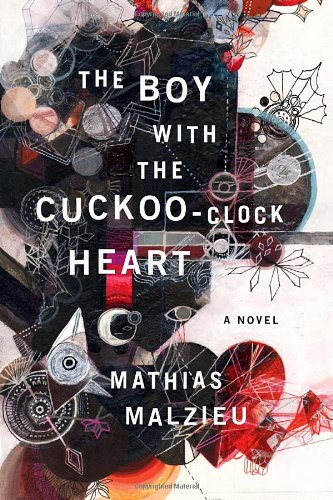
 The Boy with the Cuckoo-Clock Heart by Mathias Malzieu
The Boy with the Cuckoo-Clock Heart by Mathias Malzieu
The Boy with the Cuckoo-Clock Heart, according to the back flap, is the “basis for an album that [Mathias] Malzieu wrote.” I’d like to hear the album because I’m thinking his source material may have been better served in that medium. The Boy with the Cuckoo-Clock Heart isn’t a bad book, but even for a novella there isn’t much there and too much of it is either implied, assumed, or not earned; all of which wouldn’t matter in an album, but is disappointing in a book.
The main character, Jack, is given his odd heart at birth in 1874, when his own heart freezes on the coldest day ever in Edinburgh. Dr. Madeline is the mid-wife who gives him the heart to keep him alive and who takes him from his mother, who gives him up for adoption. Dr. Madeline warns Jack as he grows that his heart is too fragile for strong emotion and he should, therefore, never fall in love.
Of course, that is just what Jack does, with a diminutive singer named Miss Accacia. His rival for her affection is the school bully and after a horrible fight, Jack is forced to flee Edinburgh, though it dovetails nicely with his intent to find Miss Accacia who has already left the city. Along the way he picks up a magician friend, finds work in an odd little amusement/fair area, and learns both the joys and the pains of loving with a heart, whether flesh or wood.
There is a nice sense of whimsy through especially the beginning of the book, a bit of Pinocchio, a bit of Tim Burton, and a strong sense of emotion at the start with his relationships with Dr. Madeline and some of her patients — an alcoholic named Arthur and a pair of prostitutes. And the inevitable love that the reader knows is coming weights heavy on the mind. But when it’s introduced, in the form of Miss Accacia, it just never feels real. We’re told repeatedly Jack is in love, but the reader never feels it. Beyond the direct dialogue, there just isn’t any conveyance of the strength/depth necessary for us to care not just about the love, but its impact. The bully compounds the problem as he allegedly turns against Jack because he too loves Miss Accacia, but once more, we neither see nor feel it.
The rest of the book is hampered by that simple problem, and so while we dutifully follow Jack on his trek to find her again, and watch as he does and see how their relationship begins or ends, we honestly just don’t care much. The reintroduction of the bully at the end makes matters even worse.
Stylistically, there are some wonderfully inventive images in the novella, though it suffers from an overuse of simile/metaphor that on occasion pile one atop the other and become a distraction, especially when they don’t neatly work together, as is sometimes the case. This is especially true early on; Malzieu’s restraint later in the book makes the good ones shine all the better.
In the end, the core image — the boy with a cuckoo-clock heart — is a wonderfully inventive and compelling one, while the underlying suspense of when love will strike and what it’s impact will be is equally so. But the execution of story beyond image and premise falls short of their promise. I plan to check out the album, though; I can see Malzieu’s imagery and impressionistic sense working much better in music stripped of the need for straight narrative.



How did I miss this? Thanks for bringing it to my attention!
I guess that is true, Marion. And when it comes to "You Only Live Twice," I saw the movie TWICE…
I absolutely loved this deep dive into Edwige Fenech's giallo films! Her unique blend of allure and mystery truly captivates.…
You managed to work in your two loves; vintage fiction and films!
Yup, Marion, your memory serves you well! Oh...as regards these three recent Bond reviews of mine, as the old saying…